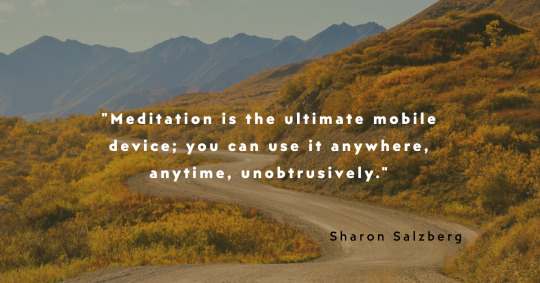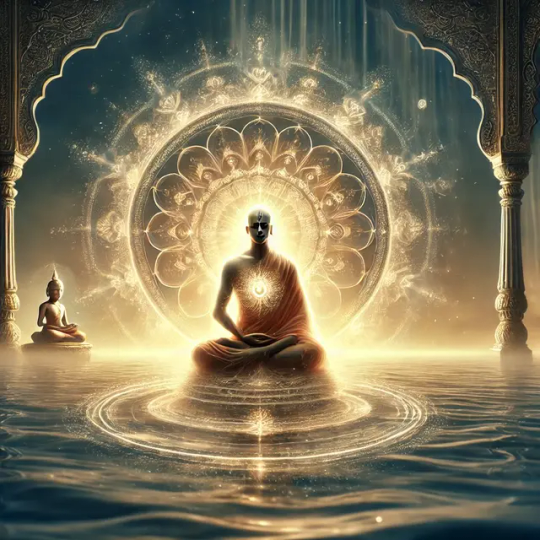#meditationmagic
Explore tagged Tumblr posts
Text
Understanding Illusion, Attachment, and Delusion

Sant Eknath’s doha emphasizes the importance of recognizing how illusion, attachment, and delusion act like intoxicating forces that cloud our judgment and bind us in worldly entanglements. The comparison to intoxication is sharp and evocative—just as alcohol distorts the mind and perception, so too do these emotional and mental attachments mislead us from the path of truth. However, the antidote to these chains of illusion is devotion to Hari, or God. It is through unwavering devotion and a heart filled with love for the divine that one can break free from these intoxicating delusions.
In this material world, human beings often fall prey to maya (illusion), mamta (attachment), and moh (delusion). These are not just abstract concepts but real forces that bind the mind and soul, pulling us away from our higher purpose.
Maya (Illusion) is the false perception of reality. It is the veil that keeps us from seeing the divine truth and makes us believe that the material world is the ultimate reality. Maya creates desires that never truly satisfy the soul, leading to an endless cycle of longing and discontent.
Mamta (Attachment) refers to the emotional clinging to worldly things—relationships, possessions, or even our own ego. This attachment brings suffering because everything in the material world is temporary. When we cling to the impermanent, we set ourselves up for disappointment and sorrow.
Moh (Delusion) is the clouding of the mind with false ideas and beliefs. It is a state of confusion where we mistake the temporary for the eternal and the illusory for the real. Moh keeps us entangled in the web of ignorance, preventing us from seeing our true nature.
Devotion as the Path to Liberation
Sant Eknath suggests that bhakti (devotion) to Hari (God) is the way to freedom. When one surrenders to the divine and offers their heart in pure devotion, the bonds of maya, mamta, and moh are shattered. This devotion is not merely a ritualistic practice but a deep, transformative process that purifies the mind and soul.
Hari Bhakti leads us to the realization of the divine presence within and around us, dissolving the illusions of separation. In the light of this realization, worldly attachments lose their grip, and the intoxicating power of delusion fades.
Surrendering to Hari means letting go of ego, pride, and the need for control. It is an acknowledgment that we are not the ultimate doers, but instruments of a higher power. This surrender allows us to transcend the limited identity we create for ourselves.
The Toolkit for Daily Devotion
To incorporate the teachings of this doha into daily life, here is a practical toolkit that can help you strengthen your devotion and free yourself from illusion, attachment, and delusion:
Daily Reflection: Begin and end each day with a brief period of reflection. Contemplate on how maya, mamta, or moh may have affected your thoughts or actions. Acknowledge where you might have been attached or misled by illusion, and remind yourself of the eternal truth.
Chanting Hari’s Name: Make it a habit to chant the name of Hari, either silently or aloud. This practice aligns the mind with divine vibrations and gradually weakens the hold of worldly attachments.
Devotional Reading: Set aside time to read spiritual texts that inspire devotion. Whether it’s the Bhagavad Gita, Ramayana, or the works of Sant Eknath himself, these readings can help anchor your mind in the divine.
Service to Others (Seva): One of the most powerful ways to dissolve the ego and break free from attachment is through selfless service. Volunteer your time or resources to help others, seeing the divine in every being.
Mindful Living: Practice mindfulness in your daily activities. Be fully present in each moment, recognizing when you are getting caught up in illusion or attachment. With time, this awareness will help you stay centered in the divine.
Surrender Meditation: At the end of the day, engage in a short meditation where you mentally offer all your worries, desires, and attachments to Hari. This act of surrender helps to ease the burden of life’s challenges and deepens your connection with the divine.
Gratitude Practice: Cultivate a heart of gratitude for everything in your life. This attitude naturally loosens the grip of attachment, as you begin to see all things as gifts from the divine, not possessions to be clung to.
Looking Ahead
The wisdom of Sant Eknath in this doha is a reminder that the forces of maya, mamta, and moh are ever-present, constantly pulling us away from our true nature. But through devotion to Hari, we can free ourselves from these intoxicating bonds and experience a life of clarity, peace, and divine love. By incorporating daily practices of devotion, reflection, and service, we can walk the path of spiritual liberation, guided by the light of Hari’s grace.
#SpiritualAwakening#DevotionToGod#InnerPeace#BreakTheIllusion#HariBhakti#SpiritualJourney#SoulGrowth#DivineWisdom#Mindfulness#LetGoOfAttachment#PathToClarity#MeditationMagic#HeartAndSoul#SeekTheDivine#LiberationThroughLove#AGImageAI
0 notes
Link
0 notes
Text

Gratitude Journaling: Amplify Your Meditation 🌟
Extend the magic of your meditation practice with gratitude journaling. ✨ After your session, take a moment to jot down a few things you are grateful for in a journal. This post-meditation reflection amplifies the positive effects of your practice throughout the day, nurturing a mindset of gratitude and abundance.
As you pen down your blessings, feel the warmth of appreciation fill your heart, and watch as it transforms your day. 🌻 Share your gratitude journaling experiences below! Let's inspire each other to cultivate a spirit of gratitude. 👇
#GratitudeJournaling#MeditationMagic#AttitudeOfGratitude 🌿#spiritual connection#spiritual awareness#mindfulness#meditation#guided meditation#youtube
0 notes
Text
#MeditationMagic#MindfulMoments#MeditationJourney#CalmMind#InnerPeace#MeditateDaily#MindfulnessPractice
0 notes
Text
Holistic Healing: Integrating Spirituality into Your Self-Care Routine

In today's fast-paced world, self-care has become an essential practice for maintaining mental, emotional, and physical well-being. From meditation to exercise and healthy eating, there are countless ways to nurture ourselves. However, one aspect that often gets overlooked in self-care routines is spirituality. In this article, we'll explore the profound benefits of integrating spirituality into your self-care routine and how it can lead to holistic healing.
Understanding Spirituality
Before delving into how spirituality can enhance your self-care routine, let's first define what spirituality means. Spirituality is a deeply personal journey that involves exploring the meaning and purpose of life, connecting with something greater than oneself, and finding inner peace and fulfillment. While spirituality is often associated with religious beliefs, it transcends organized religion and encompasses a wide range of practices and beliefs.
The Mind-Body-Spirit Connection
Holistic healing emphasizes the interconnectedness of the mind, body, and spirit. When one aspect of our being is out of balance, it can manifest as physical illness, emotional distress, or mental turmoil. By addressing all dimensions of our being, we can achieve true healing and well-being.
Integrating spirituality into your self-care routine allows you to nurture your spirit and cultivate a deeper sense of connection with yourself and the world around you. This, in turn, can have profound effects on your mental and physical health.
Benefits of Spiritual Self-Care
Stress Reduction: Spiritual practices such as meditation, prayer, and mindfulness can help reduce stress and promote relaxation. By quieting the mind and turning inward, you can find refuge from the chaos of daily life and cultivate a sense of calm and serenity.
Increased Resilience: Spiritual beliefs and practices can provide a sense of meaning and purpose, which can help you navigate life's challenges with greater resilience. When faced with adversity, you can draw strength from your spiritual beliefs and trust that there is a higher purpose guiding you.
Enhanced Emotional Well-being: Spirituality encourages self-reflection, introspection, and emotional expression. By connecting with your innermost thoughts and feelings, you can gain insight into your emotions and develop healthier ways of coping with them.
Improved Relationships: Spirituality emphasizes love, compassion, and forgiveness, which are essential qualities for nurturing healthy relationships. By cultivating these qualities within yourself, you can deepen your connections with others and foster greater harmony in your interactions.
Greater Sense of Gratitude: Spiritual practices often involve cultivating gratitude and appreciation for the blessings in your life. By focusing on what you have rather than what you lack, you can shift your perspective and find joy and contentment in the present moment.
Practical Tips for Integrating Spirituality into Your Self-Care Routine
Morning Rituals: Start your day with a spiritual practice such as meditation, prayer, or journaling to set a positive tone for the day ahead.
Nature Connection: Spend time in nature and appreciate the beauty and wonder of the natural world. Nature has a way of grounding us and connecting us to something greater than ourselves.
Mindful Living: Practice mindfulness in your daily activities by bringing your full attention to the present moment. Whether you're eating, walking, or working, strive to be fully present and engaged in what you're doing.
Gratitude Practice: Take time each day to count your blessings and express gratitude for the abundance in your life. Keeping a gratitude journal can be a powerful way to cultivate a sense of appreciation.
Community Engagement: Engage with like-minded individuals who share your spiritual beliefs and values. Whether it's through attending religious services, joining a spiritual community, or participating in group meditation sessions, connecting with others can provide support and inspiration on your spiritual journey.
Conclusion
Incorporating spirituality into your self-care routine can be a transformative journey that nourishes your mind, body, and spirit. By nurturing your spiritual well-being, you can experience greater peace, joy, and fulfillment in your life. Take the time to explore different spiritual practices and find what resonates with you. Remember, the path to holistic healing begins within.
#SpiritualSelfCare#HolisticHealing#SelfCareJourney#MindBodySpirit#WellnessWednesday#HealthyMindset#InnerPeace#SoulfulLiving#GratitudePractice#MeditationMagic#PositiveVibesOnly#EmbraceYourSpirit#HealthyHabits#JoyfulLiving#MindfulnessMatters#SoulConnection#WellnessWarrior#SpiritualGrowth#LoveAndLight#FindYourBalance
0 notes
Text
Regular meditation has been shown to lengthen attention span and focus. People who regularly meditate are typically more accurate and concentrated when performing a task. By spending 13 minutes every day for 8 weeks of meditation practice, it is possible to improve attention and memory...
0 notes
Text
Renew Your Vitality: Guided Meditation for Physical Regeneration
youtube
Embark on a journey to renew your vitality with our transformative Guided Meditation for Physical Regeneration! 🌿 Immerse yourself in a serene experience designed to revitalize your mind, body, and spirit. Let the soothing voice guide you through relaxation techniques, breathing exercises, and positive affirmations that promote overall well-being. 🧘♂️✨ Reconnect with your inner energy and unleash a renewed sense of vitality!
#MeditationMagic#RenewYourVitality#MindBodySpirit#WellnessJourney#InnerPeaceQuest#HolisticHealing#StressFreeLiving#MindfulMoments#EnergizeYourSoul#PositiveVibesOnly#Youtube
0 notes
Text

Goldene Ziele: Hannelore gegen den Stress🧘♀️✨
Begeben Sie sich auf eine ruhige Reise mit Hannelore, die mit 72 Jahren die Gelassenheit der Meditation entdeckt hat. Wir erfahren, wie sie den Stress im Ruhestand besiegt und täglich Ruhe und Klarheit kultiviert. Eine Geschichte der inneren Harmonie erwartet Sie!✨
#MeditationMagic#StressFreeRetirement#GebrStorckVerlag#magazine#publish#media#publishing#social media
0 notes
Text

This hand gesture is your key to meditation and finding inner serenity. 🧘♂️✨
1 note
·
View note
Text

#MeditationMindfulness#UltimateMobileDevice#PeaceAnywhereAnytime#MeditationMagic#UnobtrusiveZen#InnerCalmness#MindfulnessJourney#MeditateEverywhere#SpiritualWellness#FindYourZen#MindfulLiving#SharonSalzbergQuotes
0 notes
Text
"The Soul, The Devotee, The One: A Journey of Unity"

Saint Tukaram’s doha, "Apan atma, apan bhakta, ek hote" — "We are the soul, we are the devotee; we are one," encapsulates a profound spiritual truth. It transcends the typical understanding of separation between the individual and the divine. This doha invites us into an experience of oneness, where the distinction between the worshiper and the object of worship dissolves, leaving only the presence of unity.
The Essence of Oneness
At the heart of this doha lies the non-duality of existence. We often perceive ourselves as separate from the divine, as individuals who are striving to connect with a higher power. In this perception, we see ourselves as the devotee, and God as the object of our devotion. However, Sant Tukaram shatters this illusion of separation. He emphasizes that at the deepest level, the soul and the divine are one.
To understand this, we must recognize the core of what spirituality teaches us: the separation we experience is an illusion created by our limited understanding of self. The soul, our true essence, is a spark of the divine. When we act as devotees, we are not just reaching out to something external but awakening the divinity already present within us.
The Union of Devotion and Self
The relationship between the soul and devotion is beautifully illustrated in this doha. Devotion, or bhakti, is often seen as a path to connecting with God. However, Sant Tukaram’s insight here is radical—it’s not just about connection, but about realizing the oneness that already exists. The act of devotion doesn’t create unity, it reveals it.
When we offer devotion, we are not pleading for divine attention; rather, we are waking up to the truth that we are already one with the divine. In this way, bhakti becomes not an act of worship but an act of self-realization.
Beyond the Ego
This doha challenges the ego, which thrives on the belief that we are separate individuals with personal struggles, desires, and achievements. The ego seeks to divide: it makes us feel that we are small and that the divine is something to be pursued, often unreachable. But when we grasp the meaning of this doha, the ego is dissolved.
The realization that “I am both the soul and the devotee” creates a profound shift. There is no longer a need to seek something outside ourselves. We are already complete, already divine. This understanding brings immense peace because it dissolves the constant struggle to become something else. In truth, we are already what we are searching for.
Practical Toolkit for Daily Unity
To bring the wisdom of this doha into your daily life, consider the following practices. These are designed to help you experience the oneness that Sant Tukaram speaks of, not just intellectually, but in your lived experience.
Morning Affirmation of Oneness: Begin your day with a simple affirmation: “I am the soul, I am the devotee, I am one with the divine.” This statement sets the tone for the day, reminding you of your unity with the universe.
Devotional Meditation: Set aside 10 minutes each day for a bhakti meditation. Close your eyes, focus on your breath, and mentally chant the name of the divine (such as Vitthal or any other form you resonate with). As you do this, imagine the divine presence as an inseparable part of your being, not outside of you, but within you.
Gratitude as Devotion: Throughout the day, practice gratitude as a form of devotion. Whether you are thankful for a kind gesture, a beautiful moment, or even a challenge, recognize that these experiences are part of your oneness with the divine.
Ego-Free Prayer: When you pray, shift your mindset from asking for things to expressing unity. Instead of praying for outcomes, simply say, “I am already one with you, and I trust in the flow of life.”
Self-Reflection at Night: Before bed, take a moment to reflect on your day. Ask yourself: Where did I feel separate? Where did I feel connected to the divine? This practice will help you gradually reduce the moments of feeling divided and increase the experience of unity.
A Journey to Wholeness
Sant Tukaram’s doha is a call to remember our inherent unity with the divine. It strips away the illusions of separation and brings us face to face with the truth of our existence: that we are the soul, we are the devotee, and in the eyes of the divine, we are one. The journey of spirituality, then, is not about reaching out to something external but about realizing the oneness that has always been within us.
This realization not only changes how we relate to the divine but also transforms how we relate to ourselves and others. When we see the oneness in all things, our actions, thoughts, and emotions become more aligned with love, peace, and truth. By incorporating the practices outlined here, you can begin to live from this place of unity, bringing the wisdom of Saint Tukaram’s doha into every aspect of your life.
#SpiritualAwakening#OnenessWithDivine#SoulConnection#DevotionJourney#InnerPeace#SpiritualityDaily#DivineUnity#MindfulnessPractice#BhaktiWisdom#TukaramTeachings#MeditationMagic#DivineWithin#SelfRealization#SpiritualTransformation#EgoDissolution
1 note
·
View note
Link
0 notes
Text
0 notes
Photo

🌿✨ Unlock the Power of Your Heart Chakra! ✨🌿 Want to enrich your emotional and spiritual wellness? Dive into the world of the heart chakra, your epicenter of love, compassion, and self-love. 💚 Here are some tips to help open and balance your heart chakra: 🧘♀️ **Meditation**: Visualize a green light or repeat the mantra "YAM" to nurture your heart space. 💨 **Breathwork**: Harness techniques like "Heart Center Breathing" to clear emotional clutter and invite joy. 🧘♂️ **Yoga**: Poses like Camel, Cobra, and Fish Pose stretch and open the chest, energizing your heart chakra. 💖 **Cultivate Self-Love**: Engage in acts of kindness and self-care. Simple acts like a nature walk or a warm bath can do wonders. ✍️ **Affirmations & Forgiveness**: Release negativity through forgiveness and use affirmations to channel positivity to your heart. Explore the journey to an open heart chakra for a life filled with meaningful relationships and peace. For a detailed guide, check out the full article here: https://giftsparky.com/blogs/chakra/how-to-open-heart-chakra #HeartChakra #SpiritualWellness #EmotionalHealth #LoveAndCompassion #ChakraHealing #YogaForHeart #MeditationMagic #SelfLoveJourney
0 notes
Text
Attracting True Love: Guided 10-Minute Meditation for Your Soulmate
youtube
✨Embark on a transformative journey to attract true love with our enchanting "Guided 10-Minute Meditation for Your Soulmate" video! 🌟 Immerse yourself in the serene vibes as you manifest the love you've always dreamed of. 💖 Let the soothing narration and calming visuals guide you to a place where love flows effortlessly. 🧘♀️✨ Don't miss out on this magical experience – watch now and open your heart to the possibilities of true love!
#LoveMeditation#SoulmateJourney#AttractLove#ManifestLove#GuidedMeditation#HeartOpening#TrueLoveVibes#SelfLoveJourney#MeditationMagic#LoveManifestation#Youtube
0 notes